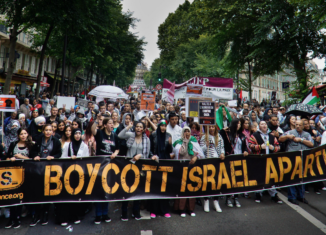By Nicolas Boeglin, Professor of Public International Law at the Faculty of Law of the University of Costa Rica, and Ghislain Poissonnier, magistrate.

Can we still expect a rational attitude from the French authorities regarding calls for a boycott of Israeli products? One may legitimately ask this question upon reading a recent dispatch from the Ministry of Justice.
In its Baldassi ruling->https://hudoc.echr.coe.int/app/conversion/pdf?library=ECHR&id=003-6718555-8953654&filename=Baldassi%20and%20Others%20v.%20France%20-%20criminal%20conviction%20of%20activists%20involved%20in%20the%20campaign%20boycotting%20products%20imported%20from%20Israel%20violated%20their%20freedom%20of%20expression.pdf] of June 11, 2020 condemning France[[ECHR, Baldassi and Others v. France (application no. 15271/16) : the Court ruled that France was to pay each of the applicants 380 euros (EUR) in respect of pecuniary damage, EUR 7,000 in respect of non-pecuniary damage and EUR 20,000 jointly to the applicants in respect of costs and expenses.]], the European Court of Human Rights (ECHR) ruled that the call for a boycott of Israeli products cannot in itself constitute a criminal offense: it is indeed protected by freedom of speech[[Baldassi & Others v. France: Article 10 protects the right to call for a boycott of goods from Israel by Robert Wintemute, Strasbourg Observers, July 17,2020]][[[Le boycott des produits et des institutions de l’apartheid israélien : un droit et un devoir, Joseph Oesterlé and Ghislain Poissonnier, AURDIP, June 11, 2020.]]. As France has not appealed the ruling, it is legally binding since September 11, 2020.
One should therefore expect the French Ministry of Justice to repeal the Alliot-Marie and Mercier dispatches of February 12, 2010[CRIM-AP n°09-900-A4]] and May 15, 2012[[CRIM-AP n°2012-034-A4]]. Indeed, these [dispatches instruct public prosecutors to prosecute those calling for a boycott of Israeli products in the framework of the international Boycott, Divestment and Sanctions (BDS) campaign.
On October 20, 2020, the Ministry of Justice, however, sent to public prosecutors a dispatch calling for “the repression of discriminatory calls for a boycott of Israeli products,”[[DP 2020/0065/A4BIS]] obviously seeking to preserve the French-style penalization of boycott calls.
The dispatch (actually an internal memorandum of penal policy) even asserts that the Alliot-Marie and Mercier dispatches are still valid and that operations calling for a boycott of Israeli products are still likely to constitute an offence.
One is therefore entitled to wonder how France is complying with a judgment of June 11, 2020 in which the European Court felt obliged to recall that it:
“… stressed on numerous occasions that Article 10 § 2 leaves little room for restrictions on freedom of expression in the field of political speech or questions of general interest.” (§78).
A few lines earlier, the European Court had indicated that the calls for a boycott of Israeli products concern precisely “a subject of general interest, namely the compliance with public international law by the State of Israel and the human rights situation in the occupied Palestinian territories, and were part of a contemporary debate, open in France as in the entire international community” (§78).
It is clear that the French authorities refuse, in violation of the hierarchy of norms, to submit to the decision of the ECHR and to European law. Worse still, the dispatch takes us back to before June 11, 2020, when the criminal division of the Court of Cassation saw the call for a boycott as a discriminatory appeal.
It is as if the summa divisio enshrined in the ECHR did not exist. However, the Baldassi ruling explains very clearly that a distinction must be made between, on the one hand, incitement to refrain from consuming products to challenge the policy of a State, and on the other hand, calls for violence against people (or racist and anti-Semitic remarks targeting Jews as an ethnic-religious collective) or the destruction of property. The first is perfectly legal, as it is covered by the right to freedom of speech. The latter constitute hate speech that must be prohibited.
The dispatch plays on what might at first glance appear to be a grey area between these two situations, by asking public prosecutors to observe whether or not a call for a boycott of products constitutes a call for discrimination based on the national origin of a person or group of persons. Thus, the dispatch feeds the ambiguity around these two situations, by refusing to admit, unlike the ECHR which states it, that it is possible to distinguish, to parody Steinbeck, between “products and men”.
This ambiguity is also fed by maintaining a vagueness about the distinction between the call for a boycott of Israeli products and anti-Semitism, without clearly specifying what could tip one towards the other[[« Boycott des produits israéliens : la France persiste à y voir un délit en dépit de la décision de la CEDH » by F. Dubuisson and G. Poissonnier, Actu-Juridique.fr, Edition of 12/11/2020.]].
In the end, the dispatch is more than disappointing in terms of its legal content. This is probably because it fails to conceal its clearly political goal: to suppress at all costs the calls for boycotting Israeli products launched in the framework of the Boycott, Divestment and Sanctions (BDS) campaign.
